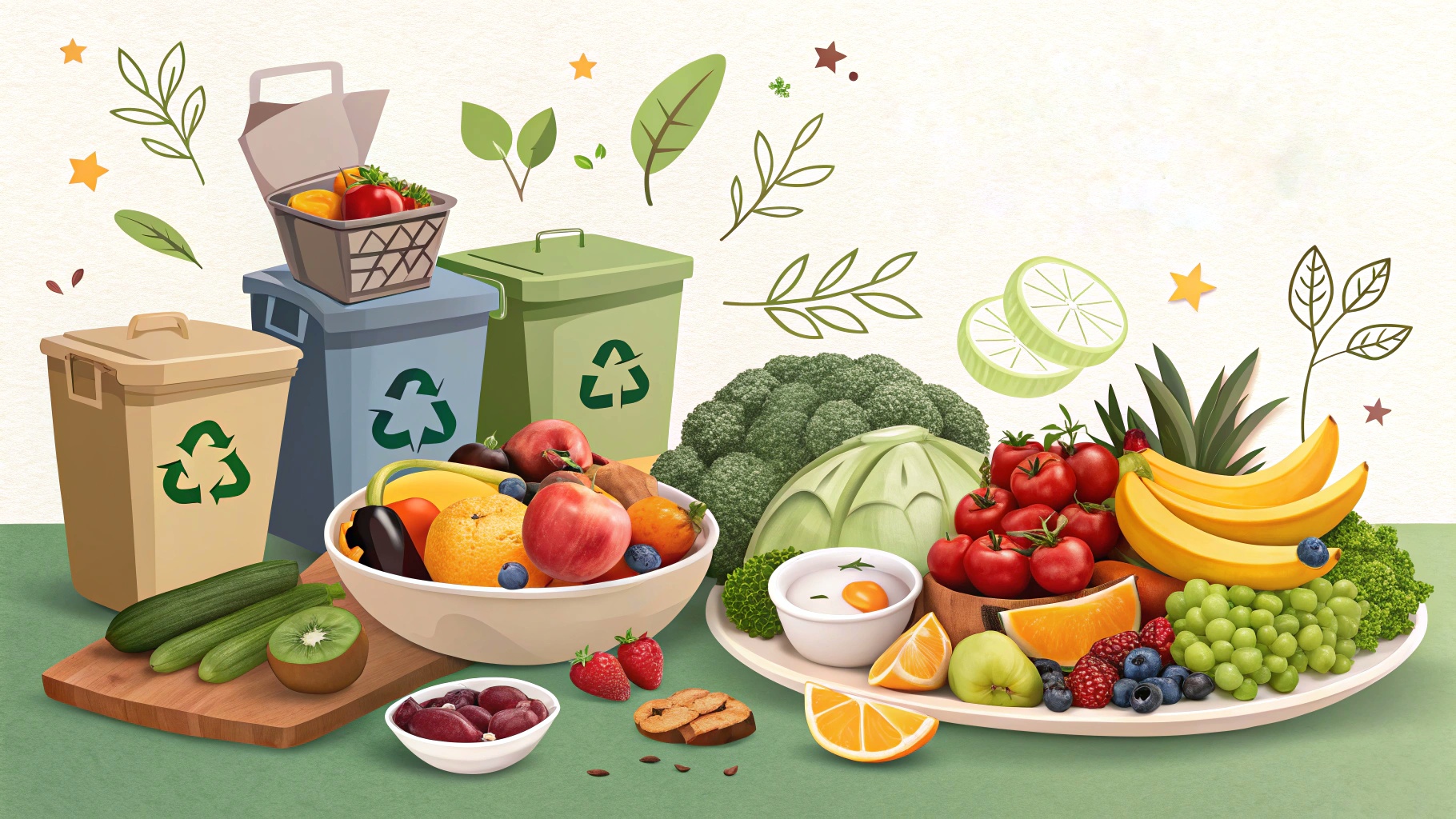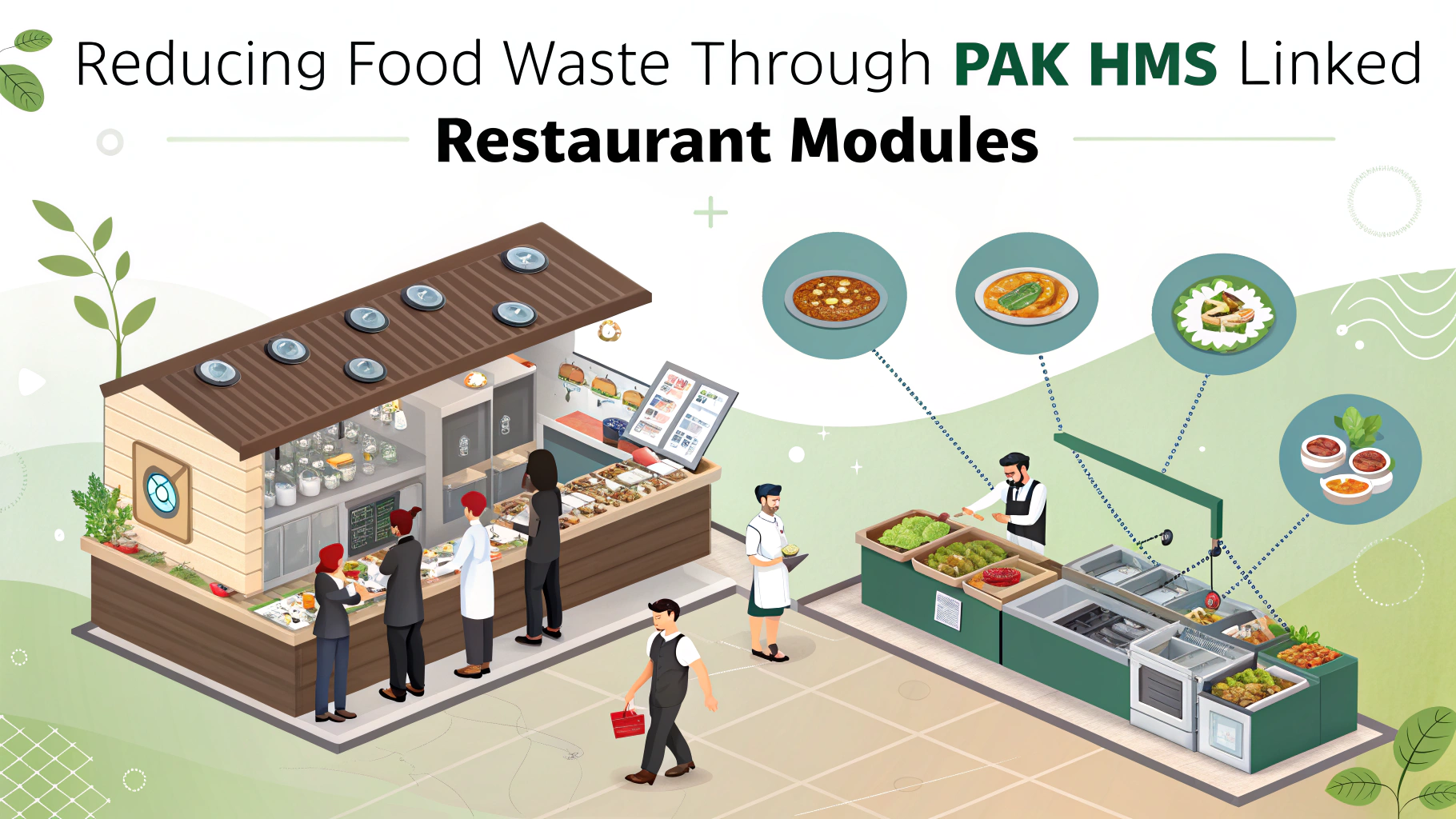Reducing Food Waste Through PAK HMS-Linked Restaurant Modules (2025 Hospitality Sustainability Guide)
Food waste is one of the most overlooked yet critical challenges in the hospitality industry. According to the United Nations, nearly one-third of all food produced globally is wasted—and a significant portion comes from the hotel and restaurant sector. In Pakistan alone, hotels contribute to thousands of tons of edible food waste annually. In 2025, this is not only unsustainable—it’s unacceptable.
For hoteliers using PAK HMS, Pakistan’s leading hotel management system, there’s a powerful yet underutilized tool for tackling this issue: the PAK HMS Restaurant & POS Modules. These modules not only streamline kitchen operations, but when configured correctly, can drastically reduce food waste, save money, improve efficiency, and support a greener future.
This blog dives into how PAK HMS helps hotels and resorts reduce food waste with precision through data, automation, and smart analytics.
🍽️ The Scope of the Problem: Food Waste in Hospitality
Food waste in hotels occurs at multiple stages:
- Procurement: Overstocking perishables
- Storage: Improper preservation leading to spoilage
- Preparation: Over-prepping meals based on incorrect forecasts
- Plate Waste: Guests leaving uneaten food
- Buffets: Large volumes of untouched or discarded food
The consequences aren’t just environmental:
- Financial losses in food costs
- Higher waste management expenses
- Negative guest perception
- ESG compliance risks
Reducing food waste is not just good practice—it’s smart business.
🧠 Enter PAK HMS: Data-Driven Waste Management
The Restaurant & POS (Point-of-Sale) modules of PAK HMS do more than handle orders and payments. With full integration into hotel operations, they can:
- Forecast demand based on bookings and guest profiles
- Track ingredient usage and spoilage trends
- Generate portioning guidance
- Offer real-time inventory status
- Identify high-waste menu items
- Integrate guest feedback on food quality and portions
All this adds up to one thing: intelligent, waste-aware F&B operations.
🔍 1. Smart Demand Forecasting Reduces Overproduction
By integrating room occupancy, event bookings, and historical dining data, PAK HMS forecasts:
- Expected number of guests per meal period
- Menu preference probabilities (vegetarian vs meat, regional vs international)
- Seasonal ingredient demand
This allows the kitchen to:
- Prepare accurate quantities
- Optimize prep schedules
- Prevent unnecessary batch cooking
Example: If the system forecasts a 70% occupancy of international tourists during Eid, the kitchen can shift away from local-cuisine buffets and reduce over-prep of dishes less likely to be consumed.
📦 2. Real-Time Ingredient Tracking Prevents Spoilage
The Inventory Module within the Restaurant POS system logs:
- Perishable stock quantities
- Expiry dates
- Vendor delivery schedules
- Real-time usage against standard recipes
It alerts F&B managers to:
- Approaching spoilage deadlines
- Overstock conditions
- Ingredients not being used as per plan
This enables:
- Menu adjustments to prioritize at-risk ingredients
- Flash promotions to clear inventory (e.g., “Chef’s Special using organic spinach”)
- Avoidance of last-minute disposal
🧾 3. Recipe-Level Waste Analytics
Each dish in the PAK HMS system is linked to:
- Standardized portion size
- Ingredient breakdown
- Expected prep waste (e.g., peelings, trimmings)
The system tracks:
- Deviations from portion norms
- Prep waste exceeding average thresholds
- Under-consumed dishes (via guest feedback or leftovers)
Chefs receive performance dashboards—comparing real usage vs standard—helping to:
- Train kitchen staff on more precise cuts
- Review overly complex recipes
- Swap in efficient alternatives
📊 4. Buffet Management Optimization
Buffets are notorious for waste. With PAK HMS you can:
- Track how much of each dish is being consumed using plate return data or manual entry
- Estimate prep-to-waste ratio across service windows
- Adjust serving volumes dynamically based on real-time uptake
Smart Alerts (examples):
- “Paneer Masala Tray Over 60% Unconsumed — Consider Half Tray Next Shift”
- “Fruit Salad Spoiling Every Day — Drop Item or Improve Storage”
- “Only 3/15 guests chose Beef Nihari — Replace with Veg Option”
Buffet waste can be reduced by up to 40% using such dynamic tracking.
📱 5. Guest Feedback Loop on Food Quality & Portions
The Feedback Module enables:
- Post-meal surveys (portion size, flavor, freshness)
- Plate photo reviews (for AI waste analysis, if enabled)
- Special request tracking (e.g., “half rice, no sauce”)
This feedback is used to:
- Refine portion sizes
- Spot recurring waste due to guest dissatisfaction
- Offer custom serving options for returning guests
With Unified Guest Profiles, returning diners can automatically trigger: “Suggest Smaller Portion – Past Feedback on Over-serving.”

🧾 6. Procurement & Vendor Insights
The procurement dashboard reveals:
- Frequent sources of spoiled deliveries
- Ingredients regularly over-ordered
- Most waste-efficient suppliers
The system can automate:
- Auto-adjusted reordering based on previous waste
- Replacing high-waste items with shelf-stable alternatives
- Preferencing local vendors to reduce transport emissions
Hotels can also rate vendors by:
- Delivery freshness
- Packaging waste
- Portion predictability
♻️ 7. Staff Training, Monitoring, and Incentives
PAK HMS assigns eco-efficiency KPIs per F&B role:
| Staff Role | Tracked Metric |
|---|---|
| Head Chef | Waste per meal served |
| Line Cook | Accuracy in prep vs standard |
| Server | Feedback on portion satisfaction |
| Procurement Manager | Spoilage cost per item |
| Buffet Manager | Daily buffet disposal weight |
You can run competitions, reward top performers, and include these KPIs in HR reviews using the integrated staff dashboard.
🧠 8. Predictive AI Recommendations (2025+)
The latest PAK HMS release includes:
- AI-generated prep plans based on 30-day trends
- Suggested portion changes for specific demographics
- Alerts for menu combinations that lead to frequent waste
- Weather-linked suggestions (e.g., “Reduce heavy meals on hot days”)
This gives your kitchen not just insight—but foresight.
🏨 Case Study: Nourish Hotels, Lahore
Problem: Nourish Hotels ran 4 buffets daily across 3 locations. Monthly food waste averaged 280 kg per property.
PAK HMS Intervention:
- Integrated POS with kitchen inventory and occupancy data
- Enabled waste tracking via return logs
- Activated recipe portion control with alerts
- Trained F&B team using in-platform LMS modules
Results After 6 Months:
- 38% reduction in overall food waste
- ₹600,000 monthly savings in food procurement
- 50% increase in positive guest feedback on food customization
- Qualified for national eco-hospitality certification (PSHI Tier 2)
📅 6-Month Food Waste Reduction Plan Using PAK HMS
Month 1–2: Setup
- Link restaurant modules to kitchen and inventory
- Train chefs on system alerts and portion standards
- Start logging buffet returns and spoilage
Month 3–4: Optimization
- Review dish-level waste reports
- Adjust menu based on consumption data
- Launch guest surveys for feedback loop
Month 5–6: Expansion
- Integrate procurement and staff KPIs
- Start predictive AI usage
- Apply for certifications and sustainability grants
✅ Final Takeaway: Less Waste, More Value
Food waste is a solvable challenge. With the right insights, you can:
- Cut operational costs
- Delight guests with better portions and choices
- Protect the planet by reducing landfill and emissions
- Elevate your brand as an eco-conscious hotel
PAK HMS Restaurant Modules offer an end-to-end solution—seamlessly connecting kitchen, guest feedback, procurement, and analytics into one powerful sustainability toolkit.



Leave A Comment